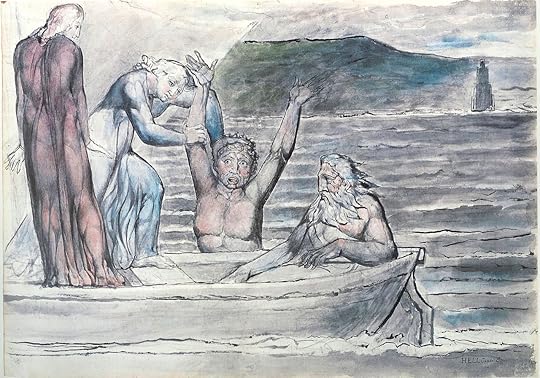How to overcome the Devil’s temptation

Dante’s Inferno, Canto 8 by Blake (Wikimedia Commons).
Last week I wrote about the three sources of temptation. Now let’s look at temptation by the Devil in more detail.
Two Scripture passages show us how the Devil tempts us. Genesis 3 tells how Adam and Eve gave in to temptation and sinned. Matthew 4 tells how Jesus resisted the Devil’s temptation. The two stories contain striking similarities.
The lust of the flesh, the lust of the eyes, and the pride of lifeWhen the Devil tempted Eve, the first thing she noticed was that the forbidden fruit was “good for food” (Gen 3:6). Similarly, the Devil first tempted Jesus by telling Him to turn stones into bread (Mt 4:3). So we see that the Devil often begins by appealing to our natural appetites. In fact, he tempts us with the desires of the flesh.
Apparently, Eve was not completely swayed by this temptation, for she also noticed that the fruit was “a delight to the eyes.” Catholic tradition equates this delight with greed–the desire to have something that is not rightly ours, or to have it in overabundance, or otherwise outside of God’s will. Matthew’s Gospel sets this as Jesus’ third temptation. The Devil promised Jesus all the kingdoms of the world for the “small” price of worshiping him. It’s easy to see how this corresponds to temptation by the world.
The final temptation is to pride. Eve desired the forbidden fruit in order to be like God, outside of grace. The Devil tempted Jesus to presume on His relationship with God, trying to force God’s hand, rather than submitting humbly to God’s will.
John the Apostle calls these temptations the lust of the flesh, the lust of the eyes, and the pride of life (1 Jn 2:16). These are the three types of concupiscence, according to the Catechism (2514).
Pride is the province of the DevilWhile the Devil can tempt us towards any sin, he often lets the world and the flesh tempt us to lust, gluttony, sloth, and greed. He tempts us directly to anger, envy, and pride–especially pride.
Catholic tradition says that pride and envy caused Satan’s downfall. Angels can’t be tempted by lust (of the flesh or the eyes), because they are pure spirits. Having no bodies, they do not desire food, sex, or material possessions. Nor do they desire ease. But some of them wanted to be equal to or above God in authority (pride). They envied man’s future glorification. They became angry that God had different plans for them.
Pride can easily lead to a refusal to repent, which is the unforgivable sin. Even if we don’t go that far, it can stop us from growing spiritually, because we think we are already holy enough. The Devil will also try to tempt us to despair, which is another form of thinking too much about ourselves and not enough about God.
Everyone is tempted by these sins, but people with Contemplative Homeschool.



